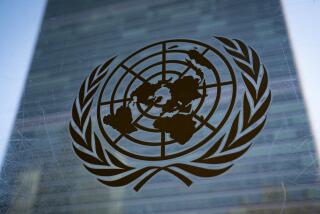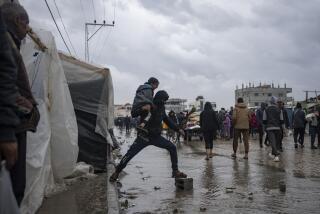Letter Bombs Prompt U.N. Security Review
- Share via
UNITED NATIONS — After the discovery of four letter bombs hidden in mail here, U.N. officials launched a full review Tuesday of security operations.
Although the world body was not the specific target of the bombs--addressed to the U.N. bureau of the Arabic-language newspaper Al Hayat--the Monday incident exposed gaps in security.
This occurred at a time when the U.N. is the target of hostility by American right-wing groups and when it plays at least a peripheral role in seeking to resolve almost every international conflict.
One official conceded privately that the U.N. was blessed with great luck in thwarting the letter bombs--because the suspect envelopes were uniform and easy to spot and because earlier bombs sent to Al Hayat offices in Washington and London warned officers here to be on alert.
Even so, the first of the letters to be discovered had passed undetected through initial screening, including an X-ray machine. The device was within 20 minutes of delivery to its intended victim before it was intercepted.
Once the first bomb was spotted by a security guard, U.N. officials decided to reexamine every piece of undelivered mail in the building--80,000 pieces--and found three other letter bombs. In each instance, the explosives were removed by a New York police bomb squad to a basement. There, they were surrounded by sandbags and soaked with a water cannon, which disabled the devices.
The search continued Tuesday, and the U.N. refused to accept more mail until the backlog was completed. No more bombs were found, U.N. spokesman Fred Eckhard said, adding that U.N. Security Chief Michael McCann had begun an internal review.
“The chief is looking into what additional investments the U.N. might have to make to enhance security,” he said. “He’s probably going to need additional people and maybe some additional equipment.”
But finding the money for more equipment might prove troublesome. The U.N. has been reducing its employees in recent years, and, since 1984, the New York-based security staff has been cut from 214 to 176; because of vacancies, the force is even smaller--162 workers. An effort to upgrade security after the 1993 World Trade Center bombing was sidetracked by budget considerations.
The constraints stem largely from the failure of almost half the U.N. member states to maintain their annual dues, which are assessed based on national wealth. The largest debtor is the United States, which owes $1.3 billion.
Aside from disrupted mail service, business as usual resumed Tuesday at U.N. headquarters. Journalists with offices in the building were given a briefing on bomb detection.
More to Read
Sign up for Essential California
The most important California stories and recommendations in your inbox every morning.
You may occasionally receive promotional content from the Los Angeles Times.










